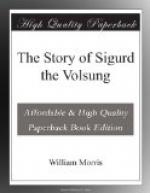They fell on the cities of the plains, but none might resist the valour of Sigurd, and the Niblungs turned in triumph from the war, bringing rich spoil. So all that winter Sigurd fared to war with them and grew greater in glory and more beloved of all men, but ever the thoughts of his heart turned to Lymdale and to Brynhild who awaited him there.
Now sheathed is the Wrath of Sigurd; for
as wax withstands the flame,
So the Kings of the land withstood him
and the glory of his fame.
And before the grass is growing, or the
kine have fared from the stall,
The song of the fair-speech-masters goes
up in the Niblung hall,
And they sing of the golden Sigurd and
the face without a foe,
And the lowly man exalted and the mighty
brought alow:
And they say, when the sun of summer shall
come aback to the land,
It shall shine on the fields of the tiller
that fears no heavy hand;
That the sheaf shall be for the plougher,
and the loaf for him that sowed,
Through every furrowed acre where the
son of Sigmund rode.
Full dear was Sigurd the Volsung to all
men most and least,
And now, as the spring drew onward, ’twas
deemed a goodly feast
For the acre-biders’ children by
the Niblung Burg to wait,
If perchance the Son of Sigmund should
ride abroad by the gate:
For whosoever feared him, no little-one,
forsooth,
Would shrink from the shining eyes and
the hand that clave out truth
From the heart of the wrack and the battle:
it was then, as his gold gear
burned
O’er the balks of the bridge and
the river, that oft the mother turned,
And spake to the laughing baby: “O
little son, and dear,
When I from the world am departed, and
whiles a-nights ye hear
The best of man-folk longing for the least
of Sigurd’s days,
Thou shalt hearken to their story, till
they tell forth all his praise,
And become beloved and a wonder, as thou
sayest when all is sung,
‘And I too once beheld him in the
days when I was young.’”
* * * * *
Yea, they sing the song of Sigurd and
the face without a foe,
And they sing of the prison’s rending
and the tyrant laid alow,
And the golden thieves’ abasement,
and the stilling of the churl,
And the mocking of the dastard where the
chasing edges whirl;
And they sing of the outland maidens that
thronged round Sigurd’s hand,
And sung in the streets of the foemen
of the war-delivered land;
And they tell how the ships of the merchants
come free and go at their will,
And how wives in peace and safety may
crop the vine-clad hill;
How the maiden sits in her bower, and
the weaver sings at his loom,
And forget the kings of grasping and the
greedy days of gloom;
For by sea and hill and township hath
the Son of Sigmund been,
And looked on the folk unheeded, and the
lowly people seen.




